Archives > Volume 19 (2022) > Issue 2 > Item 14
DOI: 10.55521/10-019-214
Stefanie Vogt, MA, Dipl. Soz.päd.
TH Köln, University of Applied Sciences
stefanie.vogt@th-koeln.de
Melanie Werner, Dipl. Päd.
TH Köln, University of Applied Sciences
melanie.werner@th-koeln.de
Eva Grigori, MA
St. Pölten, University of Applied Sciences
eva.grigori@fhstp.ac.at
Prof. Dr. Holger Spieckermann
IU International University of Applied
Sciences
holger.spieckermann@iu.org
Vogt, S., Werner, M., Spieckermann, H. & Grigori, E. (2022). Social Work Students Attitudes towards Deservingness of Social Help: Results of Research in Five European Schools of Social Work. International Journal of Social Work Values and Ethics, 19(2), 244-273. https://doi.org/10.55521/10-019-214
This text may be freely shared among individuals, but it may not be republished in any medium without express written consent from the authors and advance notification of IFSW.
Abstract
Welfare systems in Europe have fundamentally changed in recent decades: The care paradigm was replaced by a neoliberal one in which social services are increasingly linked to individual behaviour as well as to criteria of belonging or not belonging. Students of Social work grow up in these systems and studies (e.g. Fenton 2020, 2021a) raised the concern that students of social work already internalized the neoliberal narrative of self-responsibility and self-sufficiency. This was the starting point of a European research project, including five Schools of Social Work from Austria, Denmark, England, Germany, and Spain. A survey with over 400 first year students raised the question, what influence do neoliberal narratives have on students’ conceptions of deservingness. This article presents some results of the research project focusing on the following questions: How do students perceive social problems and who do they perceive as deserving and undeserving groups? How authoritarian are the students’ attitudes and to what extent do they affect the explanation of social problems? The results show that the neoliberal narrative seems to have little influence on social work students’ attitudes: They link receiving help less to conditions and are less discriminating between target groups, more likely to hold society responsible for social problems and less authoritarian in their attitudes. Although this alleviates the concerns that students have already internalized the neoliberal narrative, it does not mean that social work education can and should neglect addressing social change processes.
Keywords: Social work, social work education, deservingness, neoliberal narrative, attitudes
Social work professionals must face ethical questions about issues including, but not limited to, social justice, fairness, solidarity daily. Banks (2012) reflects on questions of the potentials and challenges of the concept of a ‘global ethics’ and points out that although there are internationally agreed standards like the Global Social Work Statement of Ethical Principles (International Association of Schools of Social Work [IASSW], 2018), national and regional differences are still significant:
For how social work is practised in different countries is intrinsically linked to the nature of national and regional welfare regimes; social welfare laws and policies; the relative roles of the state, market, not-for-profit organisations and informal family and neighbourhood networks in welfare provision; prevailing cultural and religious norms about the family, gender, childhood and old age; and the value placed on equity, equality, individual and collective rights and responsibilities (Banks, 2012, p. 5).
In the past thirty years, one can observe a fundamental change in welfare systems all over Europe: Neoliberalism replaced social democracy in many European countries, welfare and public social services suffered severe cutbacks and a neoliberal narrative of self-responsibility and self-sufficiency became increasingly socially acceptable (Fenton, 2020). In her keynote at the European Association of Schools of Social Work (EASSW) Conference in Madrid in 2019, Prof. Dr. Jane Fenton from the University of Dundee articulated concerns about the effect of a “moralizing” neoliberal narrative of self-sufficiency on social work values and on a growing post-millennial generation who seem to be more right-wing authoritarian than previous generations (Fenton, 2021a; Grasso et al., 2017). Fenton (2021a) asked if this might lead eventually to a new form of authoritarian social work that divides social service users into “deserving” and “undeserving” groups. The results that Fenton presented of her research in Scotland conveyed a gloomy picture and suggested that there might be a new generation of social workers emerging and entering the profession who show
- an uncritical acceptance of neoliberal hegemony, including the self-sufficiency and individualism narratives;
- a lack of critical thinking and reflection skills;
- a tendency to uncritically follow regulations or instructions; and
- a lack of assertiveness (Fenton, 2020).
The question of whether these findings might also be valid for other countries led to an international research project about the “attitudes towards deservingness” of social work students in five European countries. First semester students from five Schools of Social Work in Austria, Denmark, England, Germany and Spain were asked about who deserves help under what conditions and about their understanding of the role of social work. In this article we focus on students’ conceptions of deservingness, following the questions: (1) How do students perceive social problems? (2) Who do students perceive as deserving and undeserving groups? (3) To what extent do national differences come into play? (4) How authoritarian are the students’ attitudes and to what extent does this affect their explanation of social problems? In a first step, we outline the starting point of our research, then we describe the concept of deservingness as a theoretical approach. Secondly, we introduce our research design before presenting our main results. We conclude our article with some thoughts on what our findings might mean for social work education.
Students’ Attitudes, Neoliberalism and Deservingness
Students’ Attitudes and the Neoliberal Narrative
As mentioned above, the starting point of our research was a study by Prof. Jane Fenton on the effects of growing up in neoliberal societies on social work students and their attitudes towards social work values (Fenton 2020; Fenton 2021a). Fenton’s findings are based on different European studies on social work students (Fazzi, 2016; for example Gilligan, 2007; Lafrance & Gray, 2004; Preston-Shoot, 2011; Whittaker & Reimer, 2017) as well as studies looking into generational changes regarding the generations born after 1995 (Twenge, 2018; Grasso et al., 2017). Fenton describes a tension between social work values and the neoliberal discourse of “undeservedness”, as younger social workers and social work students seem to be departing from an essentially welfare democratic practice framework towards an internalization of a neoliberal narrative (Fenton 2020; Fenton 2021a).
After neoliberal reforms were first introduced in the United Kingdom in the 1980s, by the 1990s welfare systems in other Western European countries came under pressure. The social democratic idea, that the state is responsible for the wellbeing of its citizen, was questioned and had to compete with the neoliberal one, that the market should regulate everything. Privatization became popular and individuals were expected to take more responsibility for their own situations, which led for example to cutbacks in social security and less protection for workers (Fenton, 2021a). Inequality increased all over Europe and was justified by the neoliberal narrative of self-sufficiency – to put it simply: Poverty was no longer a structural problem but a consequence of individual misbehaviour, or as Margaret Thatcher pointed out: “Poverty is a fundamental character-personality effect” (Fenton, 2021, p. 2).
Students of social work grow up within these transformed and still transforming welfare systems and, as most of them are in their twenties when entering universities, they are familiar with the nowadays omnipresent neoliberal narrative. According to Fenton (2020), younger Social work students are more likely to attribute the roots of social problems to individual causes and have internalized neoliberal narratives of self-sufficiency and individual responsibility for social problems up to the exclusion of any societal contribution regarding social problems. Social work students consider social conditions or structural influences on the circumstances of service users less and age has a significant effect on how entrants to social work programmes view social problems. Furthermore, students show a rather significant tendency to comply with rules, regulations and hierarchy with a certain readiness to abdicate responsibility to a higher authority (Fenton, 2020).
Regarding authoritarian attitudes, Fenton (2020), following Grasso et al. (2017), found that the generation addressed as “Blair’s Babies” displays an even more authoritarian attitude and scepticism towards the welfare system than the generation before. While Fenton’s study on the one hand reveals that Social work students are compassionate, altruistic and valuing diversity and rights, on the other hand, they show a clear tendency to view unemployed or – with an extension – poor people and people involved in crime as “undeserving” groups (Fenton, 2020). The concept of deservingness, introduced by van Oorschot (2000), is highly linked to the neoliberal narrative which includes a tendency of differentiating between people being worthy or not worthy of support or receiving help (Fenton, 2020).
The Concept of Deservingness
The fundamental question of deservingness is: “Who should get what and why?” (van Oorschot, 2000). Research on perceptions of welfare deservingness tries to understand whom or what social subgroups, and to what extent, individuals deem worthy or unworthy of receiving help by the welfare state (M. Nielsen et al., 2020). The concept proposes a theory in the form of a universal heuristic that individuals knowingly or unknowingly make use of to assess and measure the relative deservingness of certain subgroups. The concept suggests that people are distinguished as worthy or not worthy to receive help on the basis of five criteria – the “CARIN”-criteria (M. Nielsen et al., 2020; van Oorschot, 2000, 2006)
- Control (the less in control of own situation, the more deserving),
- Attitude (the more grateful, the more deserving),
- Reciprocity (the more reciprocation, the more deserving),
- Identity (the closer to “us”, the more deserving) and,
- Need (the needier, the more deserving).
Hence, these criteria cannot be seen as separated from each other but are intertwined: People in need are often accepted as deserving, but it plays a relevant role if their situation is seen as caused by themselves or by circumstances outside of their control like war or sickness. To be considered as deserving, it is also important that the respective subgroups or individuals are perceived as not able to change the situation on their own, which is why the unemployed tend to be seen more often as a non-deserving group. Reciprocity is an important criterion for the perception of deservingness – for example only those who have made their contribution to the social security system before should profit from social benefits (van Oorschot, 2000). In cases of people without control of their own situation, gratefulness becomes an important criterion for being considered as deserving or not. Identity often plays a role, for example concerning the deservingness of specific groups like migrants, as seen at the current example of the change in the refugee policy in Europe regarding the refugees from Ukraine: Refugees from Ukraine – who are considered as neighbours and close to their own identity – are welcome without conditions while refugees from e.g. Syria, Afghanistan or African countries are still dying at the borders. Of the introduced CARIN-criteria, control seems to have the highest impact on the perception of deservingness, followed by identity and reciprocity (van Oorschot, 2000). Control also seems to be the crucial criterion and can weaken the effects of the other criteria (M. Nielsen et al., 2020).
According to M. Nielsen et al. (M. Nielsen et al., 2020), a number of studies across different European countries found consistent patterns in rankings of more or less deserving groups: most often elderly people, sick and disabled people were perceived as most deserving while unemployed people and immigrants were regarded as less or even least deserving (van Oorschot, 2006). These patterns seem to be relatively stable in Western European countries and are rooted in their history of welfare: Elderly, sick and disabled people were the first target groups of welfare, followed by families, unemployed and latterly migrants. As van Oorschoot (2006) points out, the type of welfare regime is not the only explanation for cross-national differences on the perception of deservingness. Other variables such as religion and the wealth of a country or region have various effects, especially when comparing northern and southern countries. That is why van Oorschot (2006) writes about the cultural context of welfare state policies. The concept of deservingness also plays a relevant role regarding authoritarian values and attitudes towards the welfare state. In their study on supporters of populist radical right parties and welfare state attitudes, Busemeyer et al. (2022) emphasize the strong role of deservingness conceptions: The followers of these parties are highly supportive of “hard-working” people with long contribution records in social insurance, such as the elderly and labour market insiders. Viewed as non-deserving are often new social risk groups, (e.g., low-skilled workers or youth) as well as people with precarious attachments to the labour market, (e.g. recipients of social assistance) (Busemeyer et al., 2022). Analysing the data of the European Value Study, van Oorschoot (2006) found that people who define themselves as right-winged, generally perceive people as less deserving.
The question is, how are beliefs about deservingness and neoliberal values reflected in the attitudes of social work students. Thus, we will now outline our research design before presenting our findings.
Research Design
The initial questions of this research were:
- What social groups do first-year-students perceive as deserving and undeserving of help?
- How do students perceive social problems?
- What significance do students’ values have for their understanding of the causes of social problems?
- What significance do students’ personal experiences of social problems have for their understanding of the causes of social problems?
Based on a pilot study in Denmark, we developed a survey consisting of 18 quantitative questions, including questions drawn from the European Value Study (2008) and European Social Survey (2016, 2018) as well as questions that we developed ourselves. Survey questions were developed in English and then translated to each of the languages of the participating countries (Danish, German, Spanish). Questions concerned causes of social problems, deservingness, values regarding the role of social work and the welfare state, authoritarianism, respondents’ own experiences with social problems as well as background information.
The data was collected as a web-based survey completed by a sample of first year social work students from five Schools of Social Work across Europe (Austria, Denmark, England, Germany and Spain). However, the sample does not qualify as representative of the Schools of Social Work in the respective countries, as the programmes, admission, and social structure of the students differ across universities and regions within the countries. Therefore, we will use the abbreviation “SoSW + country” when analysing our data. Nor does the sample qualify as representative of the students of the participating universities and individual programs, since we only surveyed first year students. The data was collected in cooperation with Carmen Perez, Eva Grigori, Holger Spieckermann, Lotte Andersen, Melanie Werner, Merete Monrad, Michael Grant, Pete Nelson and Stefanie Vogt.
The sample consists of 437 respondents (see Table 1): 81,3 % of respondents are female, 16,5 % are male, 1,2 % are non-binary and 1 % report at gender not listed as a response option.
| School of Social Work | Frequency | Percent |
| SoSW Germany | 82 | 18% |
| SoSW Austria | 75 | 16% |
| SoSW United Kingdom | 41 | 9% |
| SoSW Denmark | 92 | 20% |
| SoSW Spain | 165 | 36% |
| Sum | 455 | 100% |
This article is based on the questions regarding causes of social problems, deservingness, responsibility for dealing with social problems and authoritarianism. The question regarding causes of social problems is taken from the European Values Study 2008-version (2008, Q12, Q13) and has previously been used in a study of the attitudes of social workers (Blomberg et al., 2013). The questions is, “Why are there people in this country who live in need?” followed by four response-options: Because they are unlucky; Because of laziness and lack of willpower; Because of injustice in our society; It is an inevitable part of modern progress. Respondents are asked to choose the most (Blomberg et al., 2013) important and second most important reason (Meuleman et al., 2020).
Deservingness is measured using the CARIN deservingness principles scale (Meuleman et al., 2020), a scale consisting of 13 items tapping into five dimensions of deservingness. Items are for instance “People who fall into poverty because of their own mistakes should be entitled to a living wage on benefits”, and “It is not fair that people receive social benefits to which they have not contributed”. Responses are on a five-point scale from “Disagree completely” to “Agree completely”. The deservingness scale is supplemented by questions tapping into the concern for specific groups, (e.g. persons with refugee status, persons experiencing unemployment). These items are taken from European Values Study (2017, Q61), but supplemented with items regarding groups that we found were missing from the EVS version (e.g., LGBT populations). The question is, “To what extent do you feel concerned about the living conditions of the following groups living in your country?” which is followed by a list of 13 groups of people. Responses are on a five-point scale from “Very much” to “Not at all”.
In order to place the students’ attitudes regarding responsibility for dealing with social problems, we used an item from the European Values Study (2017, Q32) where respondents are asked to place their attitude on a 10-point scale from “Individuals should take more responsibility for providing for themselves” to “The state should take more responsibility to ensure that everyone is provided for”. The scale of authoritarianism is based on a question from the Authoritarian Short scale (KSA-3) by Nießen et al. (2019). The respondents are asked to rate statements on a scale ranging from “do not agree at all” to “completely agree” based on 9 items, e.g. “We should be grateful for leaders telling us exactly what to do”, “Rules in society should be enforced without pity”, or “Traditions should definitely be carried on and kept alive”.
Before we present our findings, we would like to address some limitations pertaining to our study. First, we only included first year students in our research. Therefore, our findings can only provide information on the attitudes and values with which students enter Schools of Social Work. How values and attitudes are formed or transformed in the course of social work education we cannot answer (Şoitu & Rădoi, 2012). Here, long-term studies would be necessary.
Furthermore, the national welfare systems as well as social work, its tradition, key areas, methodological and theoretical focus together with its educational structure vary throughout Europe with possible consequences on how students in the respective countries understand the role of social work or the way they perceive social problems. Our study can only touch on these aspects and does not presume to contribute to the current comparative welfare state research (Blomberg et al., 2013; Gryaznova, 2013). Also, our sample does not qualify as representative of the Schools of Social Work in the respective countries, as the data was only collected in one school of social work in each country. As universities and the social structure of their students often differ from region to region within countries, we do not know if and what influence these regional differences, as well as differing recruiting and admission procedures of the universities etc. could have on the results (Ciccia & Javornik, 2018).
Perception of Social Problems
Social workers respond to social problems and shape interventions for and with clients. They do so on the basis of professional but also subjective values and beliefs with respect to determinants of clients’ problems, such as poverty, unemployment, substance abuse, domestic violence, For example, Reamer notes,
Practioners’ values in this regard are likely to have important bearing on the response and intervention, that is the extent to which social workers believe that clients are responsible for their difficulties in life and “deserve” help (2005, p. 28).
Therefore, as a first step, we wanted to find out how social work students perceive social problems. Accordingly, with our first question of the survey, we were following Blomberg et al. (2013) and van Oorschot and Halman (2000) when asking about the explanation of causes for social problems. Using a question from the European Social Survey, we asked the students why there are people living in need in their respective countries. Within the possible response categories, we were distinguishing between social blame (“because of injustice in our society”) and social fate (“it’s an inevitable part of modern progress”) on the one side and individual blame (“because of laziness and lack of willpower”) and individual fate (“because they are unlucky”) on the other side.
According to Blomberg et al. (2013), who are following the approach of van Oorschot and Halman (2000), the “individual blame” type of explanation focusses on factors related to laziness and a weak moral character of the people living in need, while the “social blame” explanation finds the reason for living in need in discrimination and stigmatization of vulnerable groups by more powerful societal groups. In this category, people living in need are considered victims, while ruling elites as well as societies at large, in which inequalities are accepted, are the ones responsible for the existence of social problems (Blomberg et al., 2013). In contrast to the two “blame” categories, the “fate” categories seem more fatalistic. No one is declared responsible for social problems. Instead, poverty is considered either a consequence of random bad luck or misfortune, or as the result of “natural” social processes (Blomberg et al., 2013). The fate explanation is in our understanding a form of destiny – neither the individual nor society can influence the circumstances.

Figure 1 shows, that 92% of the respondents find structural explanations on a societal level: 76% see injustice in society as an explanation for people living in need and 16% consider social problems as inevitable part of modern societies. Hardly any of the respondents consider the individual as responsible for living in need. On the one hand, these findings underline the results of van Oorschot and Halman (2000), who found in their study based on data form the European Values Study that social blame was the most frequently mentioned explanation while individual blame was the least frequently chosen reason for people living in need. Blomberg at al. (Blomberg et al., 2013) also found that social workers mostly tend to the social blame explanation. On the other hand, our findings contradict the results of Fenton (2020) that Social work students tend to individualize social problems.
Having a closer look on differences between the participating European Schools of Social Work, a gap between the Austrian, English, German and Spanish Schools of Social Work (SoSW) on the one side and the Danish SoSW on the other side is discernible: While students from the Austrian, English, German and Spanish universities are considering injustice in society as main reason for people living in need (social blame), every second student from the Danish SoSW believes that social problems are an inevitable part of modern progress (social fate). The students from the Danish SoSW show a tendency to the fate approach – on a societal as well as individual level. Nearly every fifth student agrees with the explanation that people are living in need because they are unlucky, while in the other countries, hardly any one agrees to this statement. This is consistent with findings from Blomberg et al. (2013) who found a greater variety of supported explanations by Danish Social workers and a greater support for fatalistic explanations (individual and social fate) besides social blame explanations which correspond with their findings regarding the general population:
“there seem to be fairly large differences in the perceptions of poverty between the general populations of the individual Nordic countries: the Danes often seem to explain poverty in terms of social fate (while ‘social blame’ is not favoured), while social blame seems to stand out as the single most common explanation in Sweden and Norway” (Blomberg et al., 2013, p. 70).
The blame and fate approach lead to the question of who is responsible to deal with social problems. Here, we combined questions from the European Values Study (2020, Q 32) with questions from the European Social Survey (2016, E1, E2, ESS8) asking about who the students hold responsible for handling social problems: the individual or the society? Therefore, we will distinguish two categories: “social responsibility” and “individual responsibility”. Taking also the results of the social blame and social fate question into account, it is not surprising that students in general tend to hold society more accountable for help than the individual. Figure 2 shows the distribution of the answers.
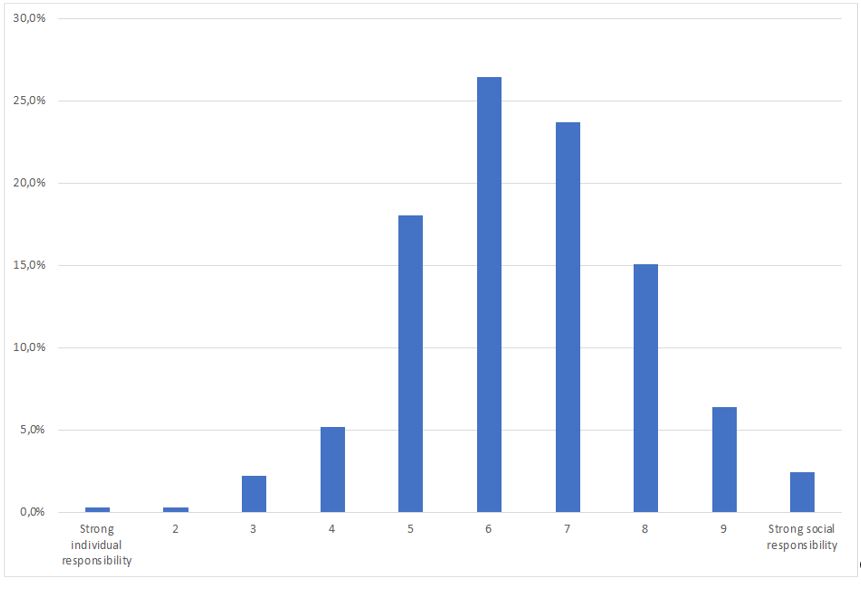
In this figure the students’ perspective on who is under what circumstances accountable for helping people in need is represented in numbers: 1 means strong individual responsibility and 10 strong social responsibility. The results show that generally, students tend to hold society more accountable for helping people in need than the individuals themselves. About 50% of the respondents choose 6 or 7. Extreme positions on the individual side are rare (4% vote for 1 to 3), while on the social side 25% are spread between 8 to 10 in their agreement on a strong social responsibility. All in all, 28,4% of all respondents are oriented towards an individual responsibility and 71,6 % are orientated towards a social responsibility. Again, these results contradict the findings of Fenton (2020) who found that Social work students tend to individualize social problems, but confirm the results of Blomberg et al. (2013).
Comparing the different Schools of Social Work (see Figure 3), the students from the Danish and English SoSW tend to an individual responsibility, while the students from the Austrian, German and Spanish SoSW show a tendency to a social responsibility, yet there is a rather equal distribution in Germany and Spain. The findings of the European Value Study (EVS 2020) regarding individual vs. social responsibility are consistent with our results but Social work students in this study all have higher means and show a tendency that the state should take more responsibility.
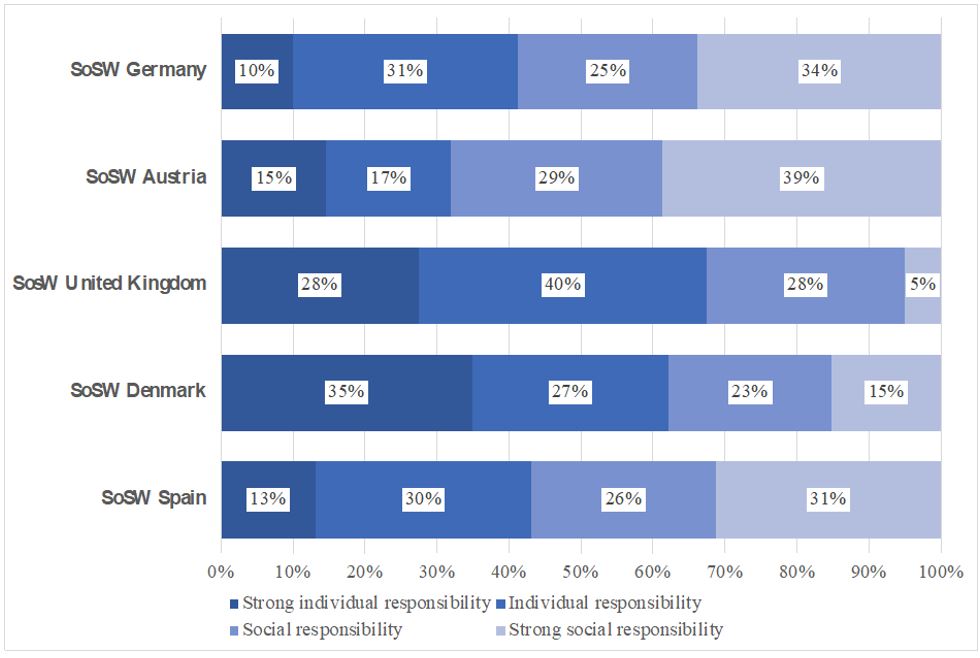
Regarding specific target groups of social work, Fenton found social work students in Scotland show a tendency to view unemployed or people living in poverty as well as people involved in crime with lesser consideration than other groups (Fenton, 2020). In the following, we will address this aspect by answering the question: Who do students perceive as deserving and undeserving groups?
Students Perceptions on the Deservingness of Specific Social Groups
Promoting social justice is one of the core principles of social work ethics (IASSW, 2018). This includes challenging discrimination and respect of diversity. At the same time, social workers often face limited resources and the challenge to ensure that these resources are distributed fairly, according to need. This leads directly to questions of deservingness and who students perceive as deserving and undeserving of help. We asked the students to what extent they felt concerned about the living conditions of specific groups living in their country. Figure 4 shows that students tend to care a little more about groups which are traditionally perceived as vulnerable, like children, victims of domestic violence or elderly people. About unemployed and people suffering from alcohol or drug abuse they showed lesser concern.
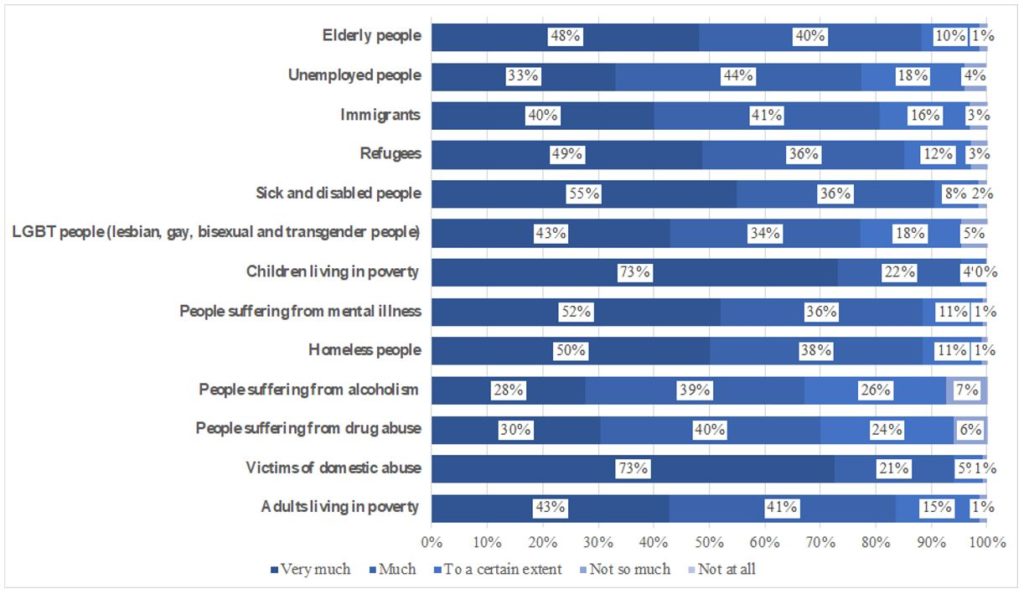
These results are not surprising as they concur with the most common rankings of sub-groups regarding deservingness and mirror the first and fifth criterion of van Oorschot’s CARIN-criteria: The less control people have over their situation and the more they are seen as needy, the more they are recognised as deserving groups. Both criteria apply to victims of domestic violence, elderly people, children living in poverty as well as sick and disabled people.
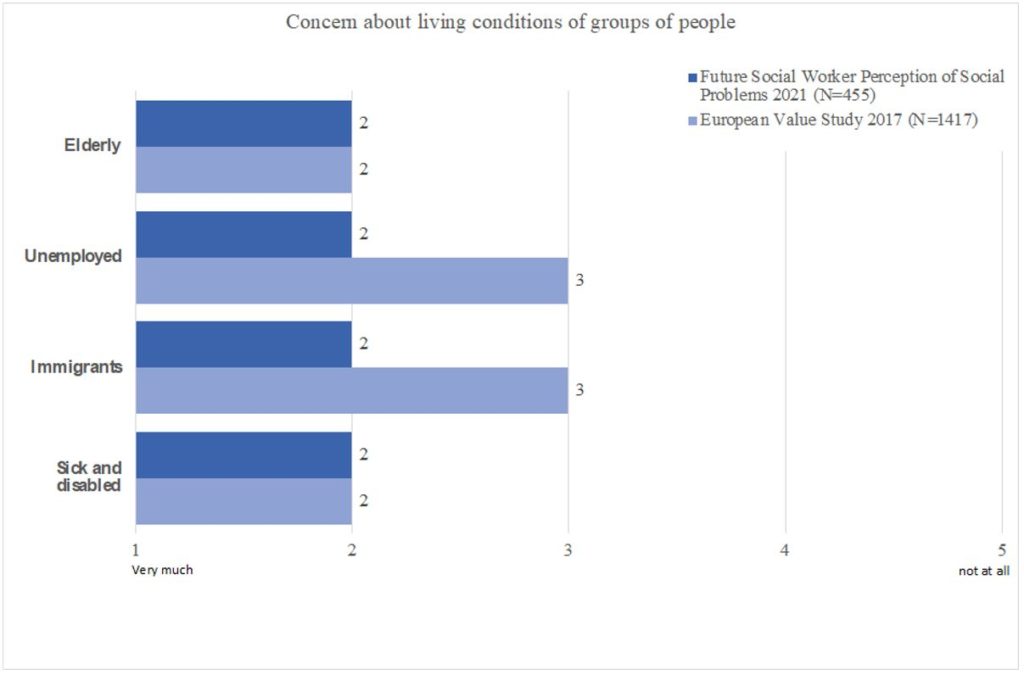
In comparison to the European Value Study there are hardly any differences between social work students and the overall population regarding their concern for the living conditions of specific groups of people (European Values Study, 2020). Only regarding unemployed people and immigrants, social work students tend to acknowledge them as deserving groups to a higher extent than the overall population. Again, our findings do not mirror those of Fenton. In her research, Fenton points out that while social work students value diversity and place a lot of emphasis on “using the ‘correct’ language and making sure they do not offend” (Fenton, 2020, p. 1253), they distinguish between deserving and undeserving groups and consider unemployed, poor and people who broke the law as undeserving (Fenton, 2020).
In his research van Oorschot (2000) points out, that people who are basically less supportive towards the needy tend to be more conditional. From such people, a person in need will not only tend to get less help, but the help will also be given less freely, i.e. only after a number of criteria are met (p. 43).
Hence, we decided in our study, to take a closer look at the question, whether deservingness is attached to certain conditions. The CARIN-criteria “Attitude” (the more grateful, the more deserving) and “Reciprocity” (the more reciprocation, the more deserving) touch upon the question of conditionality. Therefore, we asked in our survey, whether certain conditions (e.g. nationality, gratefulness, previous contributions to the social security system etc.) should be attached to receiving help from social services.
Regarding the complete data as well as cross-national differences, the majority of the respondents think that people should deserve help without fulfilling certain conditions. While 59% of the students from the Austrian SoSW and 69% of the students from the German SoSW agree or strongly agree that help should be provided without any conditions attached, 71% of the students of the Danish and English SoSW agree or strongly agree that help should be attached to certain conditions. The students from the Spanish SoSW are more divided, 54% agree or strongly agree that help should not be attached to conditions while 47% think conditions should be attached to receiving help. In the case of Denmark, this could reflect the shift in the Danish welfare system from “deservingness without conditions” to the perception that there are differences between those who lack will and/or the ability to improve and those who do not (A. Nielsen et al., 2020).
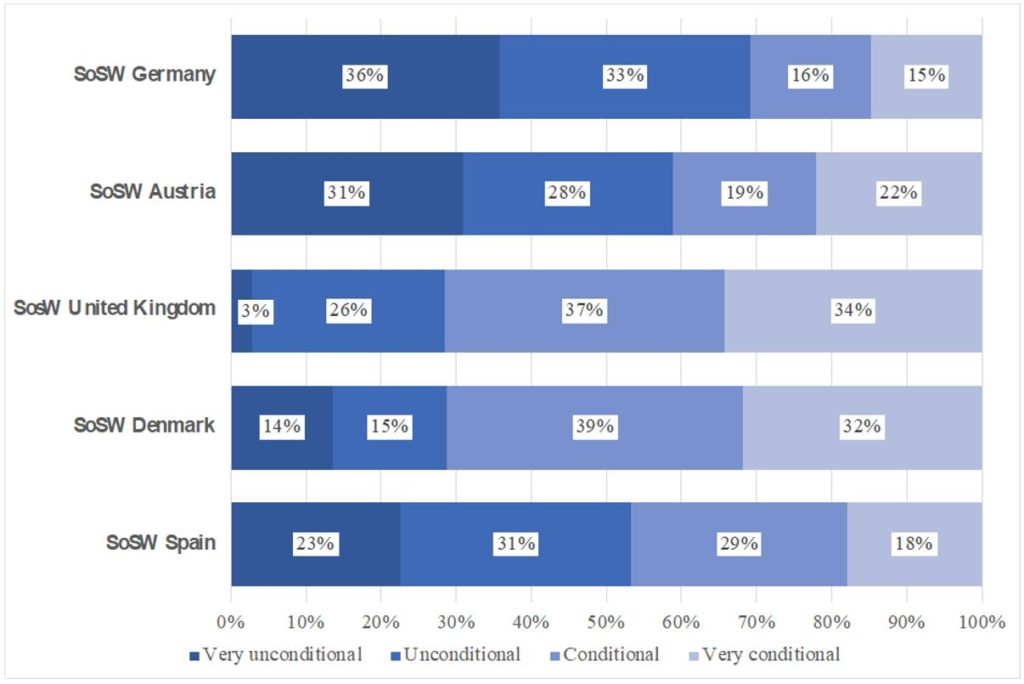
As shown before questions of deservingness and conditionality also play a relevant role regarding authoritarian attitudes. Fenton’s (2021) findings demonstrate that especially younger “millennial” students were more “right-wing authoritarian” than older colleagues and showed more punitive and authoritarian attitudes regarding groups they considered as “undeserving”, like unemployed people and persons who had committed a criminal offence. As authoritarianism poses a threat to social work – since it contradicts some of the core social work values of diversity, inclusion and equality – we will take a closer look at the authoritarian attitudes of social work students.
Deservingness and Authoritarian Attitudes
As mentioned before, social justice is one of the core principles of social work ethics. This includes challenging discrimination and institutional oppression as well as unjust policies and practices (IASSW, 2018). Therefore, social workers should challenge oppressive or unfair policies and practices and, when need arises, take a critical stand against employers or other professionals, policy makers and politicians and sometimes even the general public. In their studies, Fenton (2020, 2021) and Grasso et al. (2017) illustrate that the neoliberal narrative is often linked to authoritarian attitudes. Fenton (2020) points out that in her study students tend to show a lack of critical thinking and reflection skills, a tendency to uncritically follow regulations or instructions and a lack of assertiveness and therefore she expresses fear of an emerging new “passive authoritarian, individualistic form of social work […] as generational changes gain purchase within the profession” (p. 1254).
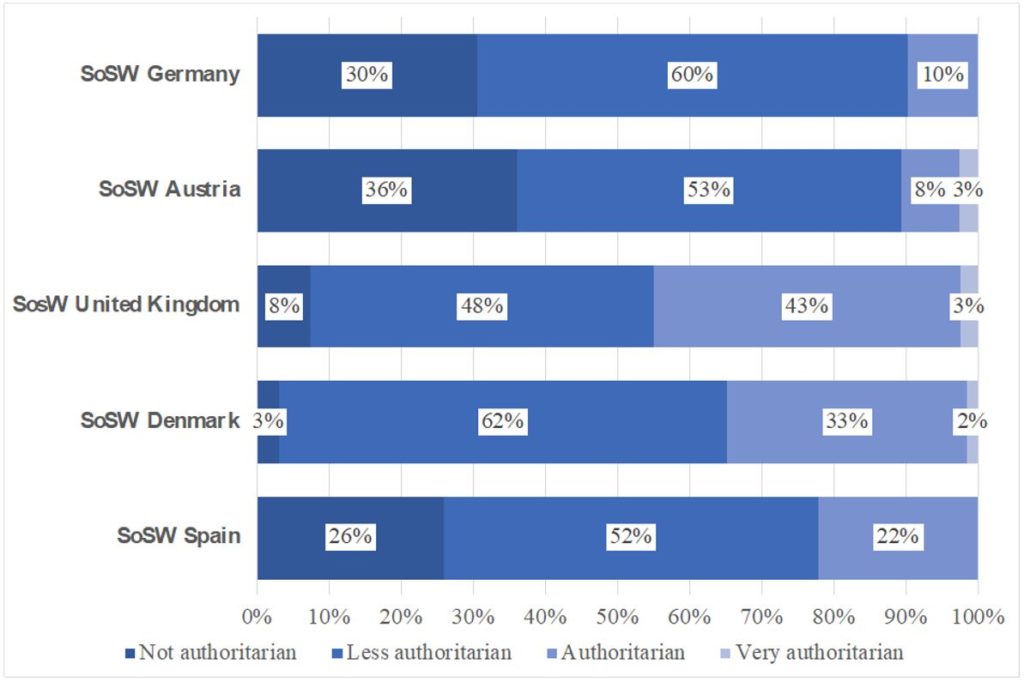
In order to find out more about students’ authoritarian attitudes we used the European short scale to measure Authoritarianism (Nießen et al., 2019), which was already tested in various studies. It is highly valid to measure if students tend to leadership and obedience or if they are more democratically orientated. Our results show that most of the students (79%) display low authoritarian tendencies and hardly any with a very high authoritarian orientation (1,5%). A closer look at the participating Schools of Social Work shows a more differentiated picture (see Figure 7 above). Nearly 90% of the students from the Austrian and German SoSW are positioning themselves as not or less authoritarian in comparison to 78% of the students from the Spanish SoSW, 65% of the Danish and 56% of the English respondents. Very few students, only 2% of the Danish SoSW and 3% of the English and Austrian SoSW, position themselves as very authoritarian, but the students from the Spanish, Danish and English SoSW show a notably higher tendency towards authoritarian attitudes (between 22%, 33% and 43%) compared with the students from the Austrian (8%) and German SoSW (10%).
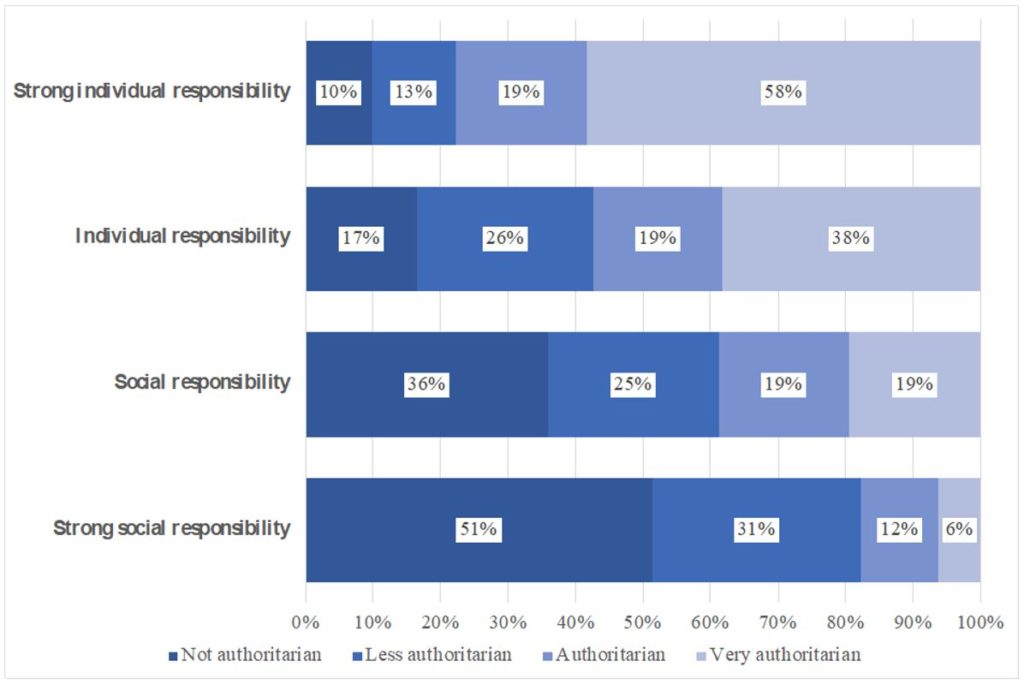
One of our hypotheses tested the assumption: The more authoritarian the students’ attitude, the more likely social problems are explained by individual reasons. The association between authoritarian attitudes and individual responsibility is highly significant. Students who assign the individual a high degree of responsibility regarding social problems show more frequently a very authoritarian orientation (58%) than students who place the responsibility on the part of society (6%).
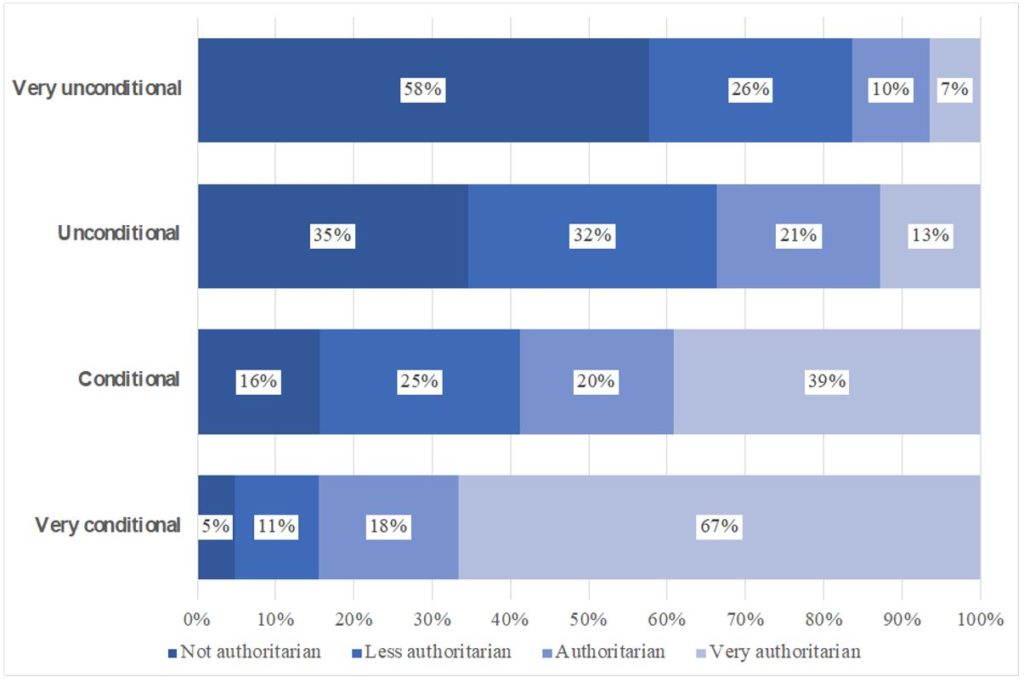
Testing the hypothesis, there also seems to exist a highly significant relation between deservingness and authoritarian values: The more authoritarian attitudes are shared by the students, the more they tend to link social support to special conditions. The less authoritarian attitudes are shared, the more likely the students disconnect deservingness from conditions. As the students in our study are in general very low on the scale of authoritarianism, Fenton’s fear of a new generation of social workers with passive authoritarian and individualistic attitudes might not be justified on a greater scale.
Conclusion
The starting point of our research was the concern that the shift to neoliberalism all over Europe has an impact on social work students in the form of a tendency to uncritically accept narratives of individualism and self-sufficiency as well as a tendency to uncritically follow regulations and that this – as a consequence – might lead them to consider target groups as less deserving. These fears could not be confirmed. Students’ attitudes broadly mirror those of the population as a whole, although they are less conditional on need, less discriminating between target groups, more likely to hold society responsible for social problems and somewhat less authoritarian in their attitudes. One could conclude that – in contrast to Fenton’s findings – the neoliberal narrative seems to have less influence on social work students from a European perspective. This might be an occasion for a small sigh of relief, but our results do not represent all of the social work students in the participating countries. The results might have shown a different picture if a representative sample had formed the base of this study. But, what’s more important, students are a part of society themselves. Students have to understand that social work is not outside but a part of modern societies and therefore must not only take societal developments and changes into account but they must reflect themselves as part of these developments and changes. Although, in our study, the participating students didn’t display neoliberal values and authoritarian attitudes to a greater extent, we agree with Fenton, that the increasing influence of neoliberal narratives and authoritarian attitudes in social discourses are indeed something to worry about, because they question the fundamental core of social work values. Therefore, we too think this should be addressed in social work education and students should reflect on the values on which they base their actions as future social workers as well as on the profession’s values. Reamer (2005) puts it succinctly:
… educators and trainers should also encourage practitioners to constructively critique the profession’s enduring, shifting, and emerging values. Practitioners must continually examine and critique the validity of social work’s values and their relevance to contemporary life (p. 27).
We would extend this statement to social work students and the reflection of their own subjective values. To do so, discussing the concept and questions of deservingness might be a good starting point.
Comparing the results of the five participating Schools of Social Work, it can be observed that the results of the Austrian and German SoSW on the one hand and of the Danish and English SoSW on the other hand appear similar, whereas the Spanish SoSW occupies an intermediate position. The students from the Austrian and German SoSW take society a little more into account, distinguish less between different target groups and are less authoritarian than their fellow students of the Danish and English SoSW. With a focus on the results regarding the students from the Austrian and German SoSW, different interpretations are possible: At the level of welfare regimes, one can draw the conclusion that Germany and Austria are both conservative welfare states, are similar in culture and the general political structure and social security system, share similarities regarding the recruitment of students, the role of social workers and therefore show similar results. On the other hand, the results from Germany and Austria could also be influenced by social desirability: A German study by Ehlert et al. (2020) suggest that authoritarian and right-wing positions are highly sanctioned in social work education. That does not mean that these perceptions do not exist at German (and Austrian) universities, but they are not communicated in public. As a result, further qualitative research in this area could prove helpful.
From a comparative perspective, the research results show that the place where you live has an impact on the concepts of deservingness and authoritarian attitudes – although this current study cannot answer the question whether the differences are due to differences in the welfare states, recruitment of the students, political culture, the role of social work in the country, local differences or regional differences in Europe. But it emphasizes that deservingness is a socialized and thus also changeable concept. If social work sees itself as reflective, then it must address this as a topic in teaching. Students must become aware of their own conception of deservingness, put it in context with social developments and compare it with the fundamental values of social work. Seminars across national borders can help to recognize the social conditionality of presuppositions.
On a political level, this means that social work must closely observe societal developments as well as the development of the welfare state and must take a position in time. The consequences of changes in the welfare states have so far affected particularly target groups of social work and social work organizations. However, a look inwards could also do well.
References
Banks, S. (2012). Global ethics for social work? A case-based approach. In S. Banks & K. Nøhr, (Eds.), Practising social work ethics around the world: Cases and commentaries, 1-31. Routledge. http://dro.dur.ac.uk/20628/1/20628.pdf?DDD34+mvrl45+dds4lmb+dss0sjb+d700tmt
Blomberg, H., Kroll, C., Kallio, J., & Erola, J. (2013). Social workers’ perceptions of the causes of poverty in the Nordic countries. Journal of European Social Policy, 23(1), 68–80. DOI: 10.1177/0958928712456575
Busemeyer, M. R., Rathgeb, P., & Sahm, A. H. (2022). Authoritarian values and the welfare state: the social policy preferences of radical right voters. West European Politics, 45(1), 77–101. https://doi.org/10.6084/m9.figshare.14141688.v1
Ciccia, R., & Javornik, J. (2018). Methodological challenges for comparative welfare state research: Capturing intra-country variation in cross-national analyses. Journal of Comparative Policy Analysis: Research and Practice, 21(1), 1-8. https://doi.org/10.1080/13876988.2018.1551598
European Social Survey. (2016). ESS Round 8 Source Questionnaire. ESS Eric Headquaters City Universtiy London.
https://www.europeansocialsurvey.org/docs/round8/fieldwork/source/ESS8_source_questionnaires.pdf
European Social Survey. (2018). ESS Round 9 Source Questionnaire. ESS Eric Headquaters City Universtiy London.
https://www.europeansocialsurvey.org/docs/round9/fieldwork/source/ESS9_source_questionnaires.pdf
European Values Study. (2008). Master Questionaire. Final Version [Questionare]. GESIS Data Archive. https://dbk.gesis.org/dbksearch/file.asp?file=ZA4800_q.pdf
European Values Study. (2017). Master Questionaire. Final Version – Alert 05 [Questionare]. Tilburg University, Leibniz Institute for the Social Science. https://dbk.gesis.org/dbksearch/download.asp?id=66239
European Values Study. (2020). European Values Study 2017: Integrated Dataset (EVS 2017), Cologne. ZA7500. GESIS Data Archive. Data file Version 4.0.0. https://doi.org/10.4232/1.13560
Fazzi, L. (2016). Are we educating creative professionals? The results of some experiments on the education of social work students in Italy. Social Work Education, 35(1), 89–99. https://doi.org/10.1080/02615479.2015.1120716
Fenton, J. (2020). Talkin’ about iGeneration: A new era of individualistic social work practice? British Journal of Social work, 50(4), 1238–1257. https://doi.org/10.1093/bjsw/bcz099
Fenton, J. (2021). The “undeserving” narrative in child and family social work and how it is perpetuated by “Progressive Neoliberalism”: Ideas for social work education. Societies, 11(123). https://doi.org/10.3390/soc11040123
Gilligan, P. (2007). Well motivated reformists or nascent radicals: How do applicants to the degree in social work see social problems, their origins and solutions? British Journal of Social work, 37(4), 735–760. https://www.jstor.org/stable/23722592
Grasso, M. T., Farrall, S., Gray, E., Hay, C., & Jennings, W. (2017). Thatcher’s Children, Blair’s Babies, political socialization and trickle-down value change: An age, period and cohort analysis. British Journal of Political Science, 49(1), 17–36. https://doi.org/10.1017/S0007123416000375
Gryaznova, O. (2013). Factors affecting welfare attitudes in different types of welfare states: Personal interests and values. Higher School of Economics Research Papers; Band Sociology, Nr. WP BRP 18/SOC/2013. https://doi.org/10.2139/ssrn.2267337
International Association of Schools of Social Work (IASSW) (2018): Global Social Wok Statement of Ethical Principles. https://www.iassw-aiets.org/wp-content/downloads/global-social-work-statement-of-ethical-principles-2018/Global-Social-Work-Statement-of-Ethical-Principles-IASSW-27-April-2018-01-English.pdf
Lafrance, J., & Gray, E. (2004). Gate-keeping for professional social work practice. Social work Education, 23(3), 235–340. https://doi.org/10.1080/0261547042000224065
Meuleman, B., Roosma, F., & Abts, K. (2020). Welfare deservingness opinions from heuristic to measurable concept: The CARIN deservingness principles scale. Social Science Research, 85. https://doi.org/10.1016/j.ssresearch.2019.102352
Nielsen, A., Enevoldsen, J. H., & Jones, S. P. (2020). Country Portrait Denmark. https://www.socialnet.de/en/international/denmark.html
Nielsen, M. H., Fredriksen, M., & Larsen, C. A. (2020). Deservingness put into practice: Constructing the (un)deservingness of migrants in four European countries. British Journal of Sociology, 71(1), 112–126. https://doi.org/10.1111/1468-4446.12721
Nießen, D., Beierlein, C., Lechner, Schmidt, I., & Lechner, C. (2019). An English-language adaptation of the Authoritarianism Short Scale (KSA-3): Zusammenstellung sozialwissenschaftlicher Items und Skalen (ZIS). https://doi.org/10.6102/zis272
Preston-Shoot, M. (2011). On administrative evil-doing within social work policy and services: Law, ethics and practice. British Journal of Social work, 14(2), 177–194. https://doi.org/10.1080/13691450903471229
Reamer, F. G. (2005). Social work values and ethics: Reflections on the profession’s odssey. Advances in Social work, 6(1), 24–32. https://journals.iupui.edu/index.php/advancesinsocialwork/article/view/73/14294
Şoitu, D., & Rădoi, M (2012). Perceptions of personal and professional values in social work training. Revista Romaneasca pentru Educatie Multidimenasionala, 4(3), 109-128. https://revistaromaneasca.ro/perceptions-of-personal-and-professional-values-in-social-work-training/
Tilburg University. European Values Study.
https://europeanvaluesstudy.eu/contact/
van Oorschot, W. (2000). Who should get what, and why? On deservingness criteria and the conditionality of solidarity among the public. Policy and Politics: Studies of Local Government and Its Services, 28(1), 33–38. https://doi.org/10.1332/0305573002500811
van Oorschot, W. (2006). Making the difference in social Europe: deservingness perceptions among citizens of European welfare states. Journal of European Social Policy, 16(1), 23–42. https://doi.org/10.1177%2F0958928706059829
van Oorschot, W., & Halman, L. (2000). Blame or fate, individual or social? An international comparison of popular explanations of poverty. European Societies, 2(1), 1–28. https://doi.org/10.1080/146166900360701
Whittaker, L., & Reimer, E. (2017). Students’ conceptualisations of critical reflection. Social work Education, 36(8), 946–958. https://doi.org/10.1080/02615479.2017.1383377